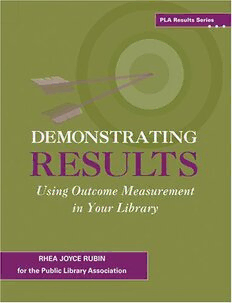
Demonstrating Results: Using Outcome Measurement in Your Library (Pla Results Series) PDF
179 Pages·2009·0.551 MB·English
Most books are stored in the elastic cloud where traffic is expensive. For this reason, we have a limit on daily download.
Preview Demonstrating Results: Using Outcome Measurement in Your Library (Pla Results Series)
Description:
Library services and programs that not only meet goals but can also demonstrate these results are more likely to secure repeat funding. By evaluating and presenting outcomes, libraries can document the positive work they do in a concrete way and gain financial support.According to Planning for Results expert Rubin, outcome measurement lets libraries evaluate how they affect their users quality of life. This latest addition to the PLA-sponsored Results Series uses familiar task breakdowns along with key terms in a step-by-step, service-oriented format so that readers can master the outcome measurement process as they: * Enhance library programs using evaluation techniques * Use and customize the 14 step-by-step workforms to address unique needs * Gather and interpret statistically accurate data to demonstrate outcomes * Measure, evaluate, and present outcomes to attract fundingApplying these concepts in examples and in two running case studies, an Internet class for seniors, and a teen mother-tutoring program brings the model to life. The Toolkit includes tips on creating evaluations, coding data, and selecting a sample.By assessing the impact of services in users lives, public library directors and program managers demonstrate to funding bodies their accountability and the effectiveness of programs, thus positioning their libraries to secure maximum funding.
See more
The list of books you might like
Most books are stored in the elastic cloud where traffic is expensive. For this reason, we have a limit on daily download.
